#this reaction that is not logical or collected or rational
Text
eddie is not someone who screams at the world.
when he’s told that shannon’s situation is bad, he immediately accepts that she is going to die. when he’s told by buck that he couldn’t find christopher, that christopher is gone, he accepts that his child is dead. eddie’s world comes down and he just...surrenders to its cruelty, and to the bitter understanding that this is the way things are. he argues with the others that he doesn’t worry about the things outside of his control, but it’s because he knows he’d never win anyway. he folds, because what other choice does he have than to accept with gritted teeth whatever torment the world chooses to inflict
so i don’t know. to see him like this? crying out for someone who’s already dead until his voice is hoarse, begging with buck’s lifeless body to respond to him, crying out against the mounting hopelessness of the situation as he fails to pull him up, as buck’s body dangles almost mockingly below him? it’s so unthinkably cruel
#if it hadn't been for everything he went through last season i don't know that he ever would have allowed himself to have this reaction#this reaction that is not logical or collected or rational#and in so many ways it's a growth of sorts but it's the worst and most painful kind -#of fully allowing yourself to feel and fight against the cruelty of the world and of the mourning and despair that accompany it#eddie diaz#buddie#911 spoilers#911 fox
1K notes
·
View notes
Text
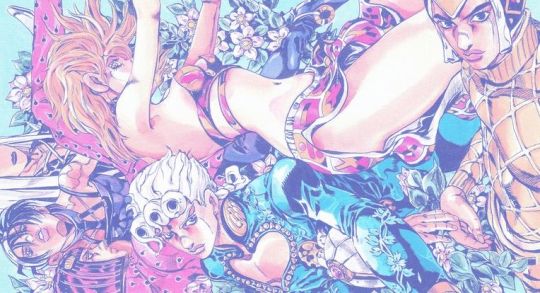
💔💔💔Bucci Gang Dealing With a Breakup 💔💔💔
Because I love making characters who experience pain experience even more pain (◣ _ ◢)
Giorno
The calm and collected blonde who had just begun to grow comfortable in letting his emotions out on display for you begins to regress back to keeping it all to himself. He doesn’t cry, he’s learned crying does nothing to fix the situation just as it didn’t fix the neglect of his mother. However, his inner turmoil prompts him to have other out of control reactions. He’s shaking more than usual, his concentration is completely off, his isolation is even more apparent even on days where it seems things are going to be okay. The others make attempts to dissuade Giorno out of these harmful habits but to no merit, it is best to let him decide when he is ready to talk about this.
The thing with Giorno however is that he will also conclude there is no need to talk about it. He hurt you and you decided to move on. It was only logical, despite how detrimental of a loss it was to him. On rare occasions, he would sit in his room, spacing out and thinking about you in every little detail, all of the observations he had made of you. It would be weeks until he would finally shed a small tear, realizing how complacent he had been in just letting you go. He was ruthless and forthcoming in other matters but he felt great shame for not showing the same degree of importance to you and the relationship.
Bucciarati
Similarly, he tries not to personalize this too much as he understands the nature of the game. He is a capo after all, of course he wouldn’t be able to freely make time for you as much as he would like. However unlike Giorno, he is more quickly to fold over and realize the emotional mess he has become. His drinking is usually always under control, but now the others have pointed out how much he drinks, downing a whole bottle of wine in a sitting. He is always able to focus on things on a rational level not letting his emotions influence him too much, but he finds his hand shaking as he holds his phone, fighting himself to not call or message you out of desperation and a need to know that you are doing fine. He also feels great shame for letting it all go too easily and for just accepting it without much of a fight.
He is able to keep appearances with the others for the most part but there are subtle changes that everyone sees but no one wants to bring up. This is Bruno after all, he will always just put their needs over his own despite their protests. He misses you, he blames himself for absolutely everything. It will take him a very long time to be able to move on. He might check in on you just to ensure your safety but is always dying on the inside if he were to ever find out you moved on with someone who could provide you with something he never could.
Fugo
Things end in a very chaotic way and immediately triggers his black and white perceptions of things. This was your fault, you weren’t being reasonable enough to understand the type of person he is. If it was his out of control anger that pushed you away from him then so be it, he obviously is in no position to make improvements on himself. Nothing much changes from his usual self other than he becomes even more snappy and becomes a bit too physically aggressive with potential enemies. He’s brought in by the older gang members about his need to cool off and even take some time to himself but he always refuses.
If he were to take time off for himself it would only lead to worse things because the only thing that would cloud his thoughts would be you. You deserved better, you didn’t deserve the ticking time bomb that he was. He finally accepts how he had a large part to play because he was still that immature, defensive child even with someone as caring and as understanding as you. He decides it's best to just let you go for someone much more suited for you. He finds himself returning to playing the piano after years of letting it collect dust, preferring there to be some noise than the echoing silence of not having you there.
Narancia
It’s hard for him to fully process and understand what it all means, or more importantly, hard for him to fully accept that your presence just wouldn’t be there anymore. The first couple of days he acts as if nothing had happened. The denial runs deep and he continues to be his old cheery self, joking with the others and looking at life through a bright lens because you’d come back after all, right? The weeks go on and it becomes more of a reality that this is how things will be from now on. He becomes more quiet, a bit more withdrawn and his zest is seemingly shot down for a lot of things.
Panic sets in and he finds himself hyperventilating more frequently, the others pointing this out of concern for him. The abandonment comes in in full fruition, having flashbacks of when he lost his mother and how his father couldn’t care less. Yes he still had the others but without you it felt entirely incomplete, there was always that caring and comforting presence of yours and it’s actually gone because of his own incompetence. It’s only when he cries it out with Fugo when he realizes that you are gone for good this time, unable to rationalize or control his intense emotions about everything.
Mista
Surprisingly, he is used to the nature of relationships, both long term and short term. This isn’t to say it doesn’t hurt him nor does he have to take some time to come to terms with what’s happened, but that’s just how life works after all. No need to dwell on it and no need to stop living just because you’re not in the picture anymore. And for a while, things seem to be going well for him! That is until he sees old pictures of you on his phone that he hasn’t bothered to delete. Or when he orders a dessert and realizes you aren’t there to share it with him. Or simply realizing how much he actually missed a lot of these small details of you, such as your scent, how your eyes looked in the sun, how your voice sounded when you called his first name.
He smiles through the pain, and the others can see that it is a forced smile for the most part. He catches himself looking through old text convos in the middle of the night, berating himself for becoming so attached and in trying to figure out where he messed up. He repeatedly tries to find some sort of logical explanation through his own world, any pattern of fours or perhaps he hasn’t been praying as often as he needs to and this is divine punishment. He’s only open about it with some members of the gang, but soon lets the feeling come and go despite how hard it is to realize that this was one of those relationships he wanted for the long term.
Abbacchio
Everyone can see the growing storm cloud over his head as his demeanor becomes even more guarded, more gloomy and more rigid. He doesn’t talk to anyone, disappearing for a while and giving the reason that there are personal things he needs to take care of. Drinking is the easy part of it and he knows it’s not the solution, but the self destructive thoughts is what kills him on the inside. It’s not even a, we had a miscommunication type of situation, he begins to genuinely believe there is just something seriously wrong with him and that he will be incapable of forming healthy relationships from here on out. Or simply refusing to have something intimate with anyone that isn’t you.
Bucciarati is the only one that catches him on his downward spiral and strenuously snaps him back into reality. He sobers up for the most part but refuses to want to know anything about what happened with you or where you are now. He rationalizes better with himself and returns to his usual routine, no questions asked. Unsurprisingly during the harder days, or when there is a reminder of you, he will use his stand to replay every single moment of enjoyment he had with you until he is to the point of exhaustion.
Trish
Almost goes through the entire stages of denial in the span of a week once it’s set in stone that things are over. There is poison in her voice and how all of this is your fault and how she never wishes to ever see you again. She regresses back into that scared teenager, afraid of what will happen to her and with no indication of who to actually trust. She trusted you, and you did too and it takes a day for her to fully come to terms that it was also her doing to have pushed you away. She finds herself lost in thought of you, spacing out in risky situations and often enough to have the others bring her attention back to earth frequently.
In the final stages she cries her heart out, her eyes permanently puffy and swollen and her voice unrecognizable as he quarantines herself in her room. She’s still holding anger towards you but now mostly towards herself. She impulsively destroys every picture she took of you only to find herself taping them all back together after the matter. She becomes more in control of herself once the adrenaline runs out, and although it still hurts, she convinces herself of worse circumstances she has been able to overcome.
#jjba part 5#jjba#golden wind#bruno bucciarati#leone abbacchio#pannacotta fugo#guido mista#giorno giovanna#trish una#narancia ghirga#bucci gang x reader#everyone is an adult here obviously
64 notes
·
View notes
Text
My Analysis of the Best Paired Endings in 3H (Part 1: Edelgard/Byleth)

Edelgard: I'm simply having trouble putting this feeling into words. I just felt…I don't know. As if something was drawing me to the Ashen Demon. I wonder… Could it be the influence of my Crest?
The story of 3H pushes Byleth with the lord of each route so hard that it almost felt pointless to add the self-insert dating-sim elements with the other students. In Persona 5, you could date whatever girl you wanted with no effect on the main story. But in 3H, it felt more like Final Fantasy X where there the love story was the main story.
This pairing absolutely felt "canon", at least in CF. As both of them bore the Crest of Flames, I strongly suspect that their relationship was meant to represent the concept of "twin flames". A twin flame is a deep soul connection between two people. They are actually thought to be twin souls inhabiting two bodies. Twin flames seem to mirror one another, have shared similar life paths, history, and sometimes trauma. They are naturally drawn to each other. This description certainly applied to Byleth.
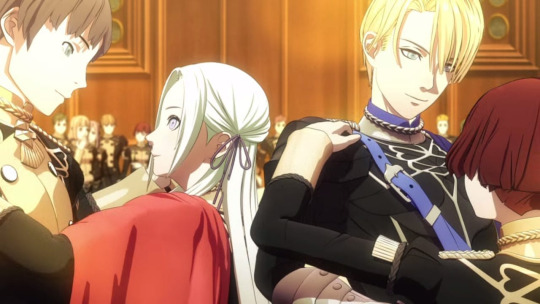
Byleth: Who was your first true love?
Edelgard: Hmm. For some reason, I feel compelled to tell you all of these things I have kept hidden. I can't say the name, but it was a noble who I met in the Kingdom, a lifetime ago.
But interestingly, it could apply to Dimitri as well. It is said that one twin flame is supposed to represent the divine masculine half of the soul and the other the divine feminine half. When the masculine and feminine energies of the twins harmonize, the two souls merge and become one.
The "divine feminine" principle is more about charting inner emotional space, while the "divine masculine" principle represents conquering the outer physical world. The characteristics of the divine masculine are logic, rationality, discipline, and assertiveness. The divine feminine is associated with goddess energy. Some of its attributes are intuition, nurturing, loving, and supporting their counterpart.
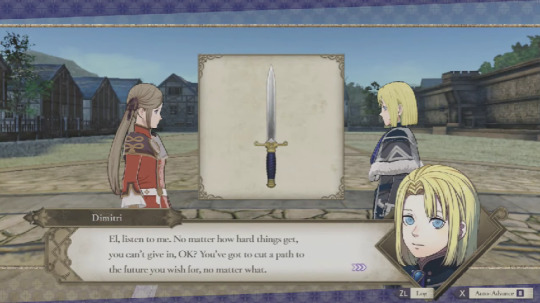
Edelgard: Professor... You've been crying. So even you cry sometimes. Oh... I suppose that was thoughtless of me to say.
Byleth: Yes, it was.
Edelgard: Long ago, someone said the same thing to me.
Traditionally, the moon represents divine feminine energy (yin) as opposed to the sun which represents divine masculine energy (yang). Edelgard is cool and collected. She is the active force of the story who wishes to bring about the new dawn. Dimitri is emotional. He is the reactive force whose storyline is symbolized by the moon. You'd expect Edelgard to be a natural yang personality and Dimitri a yin.
But Edelgard was born on the summer solstice as opposed to Dimitri being born on the winter solstice. Edelgard is a Cancer, which is a water sign ruled by the moon. Astrologically, Cancers are associated with yin energy. They are said to have a hard outer shell like a crab but are very soft underneath. Often called the mother of the zodiac, they are known for their deeply emotional and nurturing nature. They form strong attachments to their loved ones and often have a hard time letting go. It is implied that "El" cried when she learned that she'd have to leave the Kingdom. Dimitri was surprised seeing this reaction from her, but it likely influenced his choice of parting gift: a dagger symbolizing the philosophy of the patriarchal Faerghus.
I found it interesting how much Edelgard was displeased by Dimitri's gift. Even at the academy, she prefers if Byleth giver her more traditionally feminine gifts like flowers, a book, or a bear stuffy and she will be unhappy if she is given a weapon. Using a dagger to cut a path has very violent implications, although Dimitri was too young to realize that at the time. He had grown up around blades his whole life and only viewed them as tools of destiny. He wanted to reassure her that they had a future together, as long as she never lost heart. It was meant as a symbol of inner strength, nothing more.

Edelgard: Heh, so you consider me strong, do you? Even if one clings to their faith, the goddess will never answer them. Countless souls will be lost that way. Living without purpose. And I can be counted among those who have died that way as well. But that's why I must change this world, on behalf of the silent and weak!
Dimitri: And do you intend to become a goddess yourself? Will you steal the power to take action from the broken-hearted masses you claim to defend?
Cancer's greatest fear is abandonment which can cause them to be clingy. It is implied that El "died" after praying and not receiving any hand reaching out to help her. During her imprisonment, she felt totally alone and forsaken by the goddess. That's when she began to see faith as a sign of inner weakness.
Edelgard was reborn bearing the Crest of Flames. She no longer shed tears and looked to the dagger for strength. Dimitri accused her of trying to supplant the goddess. And while that may not literally be true, perhaps it was true in a figurative sense. CF is about standing firm in your principles and cutting your own path no matter who stands in your way, even the goddess herself.
Dorothea: Is there someone you have your eye on?
Edelgard: (Normal): To be honest, there's nothing resembling romance in my life at present.
(Has reached Support Rank A with a male): A certain face comes to mind at the thought...though I'm not sure you could call what we have a romance just yet. It's not that I'm disinterested. I'm simply too busy with other endeavors. I have no time to spare for such things.
Ideologically, CF represents the most traditionally masculine path for Byleth to take. Edelgard is drawn to them regardless of gender, what route you choose, and even in Hopes. But she is drawn to their stoic masculine energy and even seemed somewhat disappointed that they were crying after Jeralt's death. Women can certainly embody divine masculine energy and vice versa. Twin flames are not based on biological sex. Overall, the fandom understandably prefers Edeleth with female Byleth for the less stereotypical aspects.
But I found it interesting that even though this very Support conversation implies that Edelgard is bisexual, the dialogue only changes (I tested this myself) if she has A-Support with a male. Edelgard has paired endings with a few other male characters, but not a single one of them has the level of emotional intimacy she has with Byleth. They read like political marriages, while Edelgard truly wanted a passionate romance.

Shez asks about memories of the past.
Edelgard: Have I told you about the boy who gave me the dagger? I called him "Dee," which is all I really remember about him.
The tagline for FE3H was, "Sweet memories twisted by time's cruel hand". Dimitri said the day he gifted her the dagger was a sweet memory with a bitter ending. It's unclear why she couldn't recall that Dimitri was her first love. Perhaps when she realized her "fated path" would force her to go to war with someone so special to her, the pain caused her psyche to block out the memories of him and his identity. Who knows.
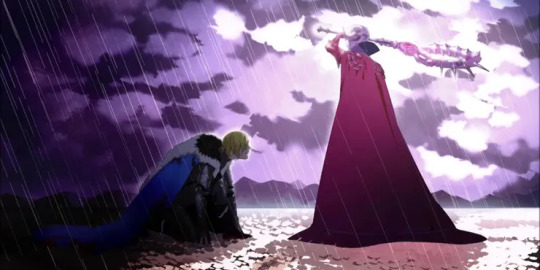
Edelgard: There was nothing I could do to save him. And so, the very least I could do was—
Byleth: Are you crying?
Edelgard: No. The Edelgard who shed tears died many years ago. Everything that's happened...it's all just part of the ebb and flow of history.
After Dimitri cursed "El" at the Tailtean Plains, she may have finally realized he was "Dee". In their A-Support, Edelgard admitted that she was actually relieved that Byleth could feel some human emotions like jealousy, but she tells them that they are both "detached" (actually "inhuman" in the JP version). Because of this, Byleth was someone she could relate to. And she does come across as rather inhuman at times. She finally does cry when she thinks Byleth dies, indicating her old self had come back to life in some way. But she was unable to cry when she killed anyone else. Even her old flame.

Edelgard: You called me El. That's... I... That means more than I can say. And this ring... It's lovely. Thank you, my dearest friend. I will happily accept it. I must admit, I feared my feelings would be unrequited. So long as I had you by my side, it never mattered how many enemies I amassed. You were all I needed.
Byleth's Crest and Edelgard's second Crest is the Crest of Flames, which is associated with The World arcana in Tarot. The World represents a successful conclusion after all aspects have been accounted for. Things have come full circle. A journey has been completed. Edelgard believed that the one leading the people of the world should be someone with humanity rather than an inhuman creature like Rhea. But there are two meanings for the word "humanity". One is "the human species" which is obviously what Edelgard meant. But the other meaning is "benevolence".
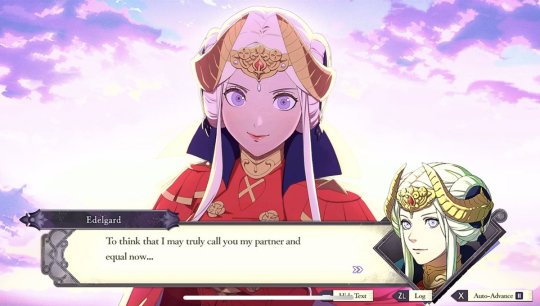
Byleth & Edelgard
Byleth and Edelgard ended the tyranny of a godlike being. Byleth was wounded and lost the power of the progenitor god, but it mattered not, as he/she and Edelgard had each other. To ensure lasting peace, the two fought against those who slither in the dark, and to ensure a society where people can rise and fall by their own merits, they spent their lives reforming the antiquated class system. They achieved much in their time together, and it is said that they were sometimes spotted leaving the palace to privately enjoy the world they had created. How they spent those precious moments, none but the two of them will ever know.
Byleth cuts down Rhea with the sword made from the remains of her dead mother. Upon doing so, they lose the power of the progenitor god. The Crest Stone in their heart is destroyed. Their soul was once merged with the goddess Sothis, but symbolically Edelgard now fills that spot as their twin flame. Byleth's heartbeat returns, and their color goes back to normal.
But their hair color was actually the origin of the nickname "Ashen Demon". So, it leaves you to wonder: Did Byleth truly maintain their humanity until the end? I'm not so sure, but I still really enjoyed how the traditionally masculine aspects of Edelgard's conquest contrasted with the little glimpses of her feminine side that only Byleth could bring out. It is certainly unique romance among JRPGs and one that I won't ever forget.
29 notes
·
View notes
Text

I tried to stay positive, telling myself that it would get better. But as the months passed, things didn’t improve.

Samuel was understandably drained when he came back from the hospital after yet another 16 hour shift. Sometimes he didn’t even reheat the leftovers I’d saved for him, but just ate his dinner cold in the kitchen at 2 AM.

On nights like that he would just pass out on the couch instead of coming upstairs.

On the days he managed to make it to bed, it probably wasn’t much better. The girls would often get up during the night and it was easier to just let them sleep in our bed instead of wasting time making them go back to their own.

Not only were we exhausted, but we also kept running into another one of what Samuel simply referred to as my issues.
“Do you really have to, Samuel?”
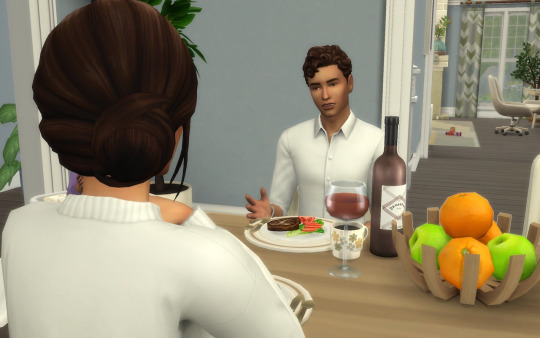
“It’s just a glass of wine, Freya.”
“You say that, but why do you have to drink it?”
“Because I enjoy it. And this one pairs well with steak.”

“There are other enjoyable beverages in the world, why does it have to be alcohol?”

“It’s not like I drink it to get drunk, Freya! A single glass of wine every other week will hardly put me at any risk for alcoholism!”

“I just don’t see why it’s necessary…”

“It’s not, Freya, that’s the point. If it was necessary, I would have a problem. Can’t I have just one thing that I enjoy for no reason around here?”
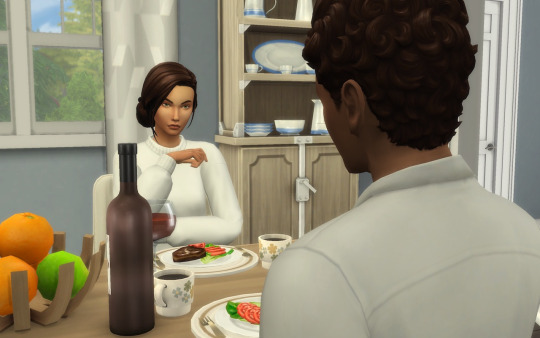
I didn’t know what to do. I wanted to cling to him, keep him in my arms forever and set everything right, but instead I found myself pushing him further and further away.
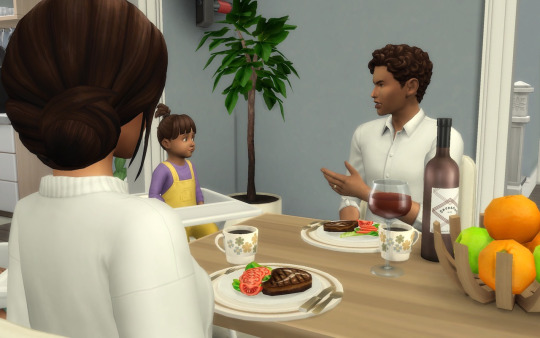
Samuel was the logical one, the rational one, the one asking if we could please not do this in front of the girls.
I knew that I was pushing his buttons to get a reaction, to see his cool and collected façade finally crack, but it never did. Even when I felt myself dissolving into desperation and tears, he kept it up.
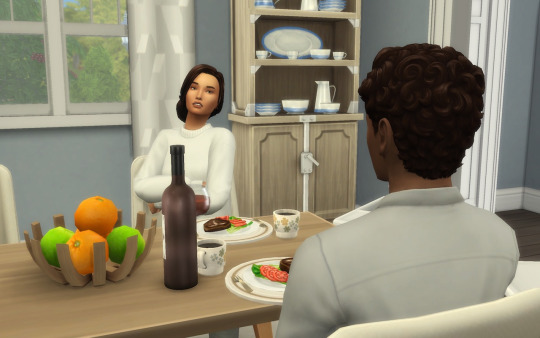
He would look at me like I was a patient and he was my physician, calmly explaining to me that I was hysterical and things would be fine if only I would trust him to help.
Always so professional when he put on the doctor face. I hated it.
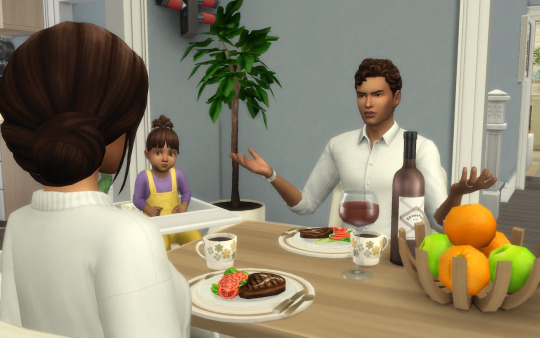
He didn’t understand the problem. Having a bit of wine often made him flirty, and I just… couldn’t. I missed him terribly, needed his touch, but when he came to bed with the combination of toothpaste and alcohol on his breath, I wanted to throw up. Sex was definitely not happening.
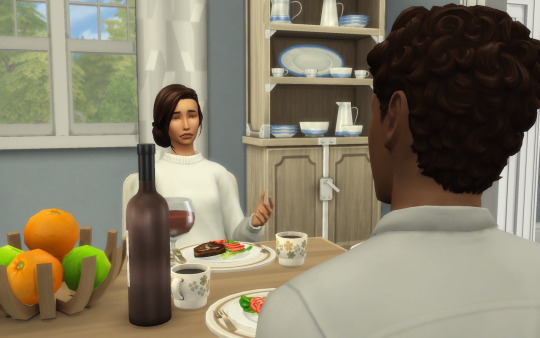
The rejection always frustrated him, of course. I had tried to explain that I just didn’t like the smell of alcohol on his breath, that it made me not want to kiss him, but he accused me of overreacting as usual.

He seemed to suspect that I was withholding intimacy as some form of punishment and started preemptively sleeping on the couch after having a drink. As if he wasn’t allowed in our bed just because I wouldn’t kiss him.
Who is withholding intimacy now, Samuel?

Some days the thoughts would assault me the minute I heard the car leave the driveway in the mornings. He was going to leave me, I just knew it. Any day now. He said he loved me, but did he really? He felt so distant, closed off. I could never quite reach him.
Had he actually stopped loving me during those seven years after I first rejected him? Or had he maybe fallen out of love with me after we got married? As the days became filled with work and diapers, the nights too filled with crying babies to risk making any more?
Maybe he was just going along with it. Out of pity? Or for the kids?

I thought back to the women he had dated before me. Did he ever lie awake at night and wish he’d picked one of them instead? Maybe someone less neurotic. Less emotional.
Once more I found myself wondering if he would have chosen me, given a second choice. We said ‘I do’, we made a promise to each other – forever and always.
But if he could start over, knowing what would happen to us, would he still be my husband?

Or would he be happily married to someone else right now?
Someone who had their shit together.
Someone who wasn’t me.

It felt like I knew the answer.
beginning / previous / next
#duchellilegacy#duchellichapters#duchelligen4#freya duchelli#samuel ward#hailey duchelli#ivy duchelli
24 notes
·
View notes
Note
I have so many songs I wanna submit for TobiIzu but I’m trying to refrain from submitting so many like a madman. Anyways Tobiizu: “Portrait of a Female” by Cruel Youth
PLEASE SEND ME AS MANY AS YOU WANT, TOBIIZU IS MY TRUE LOVE AND I LOVE WRITING FOR THEM!!😭🙏💕

"I wish I don't need you." Tobirama spits angrily on his pompous, soft lips, waiting to be kissed. He is consumed by anger, by those feelings he carries within and fights so hard against. Falling in love with his former enemy should not have been included in the peace treaty. "I've been so deprived... boy, when I'm with you, my hands are fucking tied." The Senju punches the wall, right next to his head, as the Uchiha stands motionless in his arms. He looks at him with a mixture of amusement and love, knowing exactly how he feels because it's the same thing he experiences deep inside him.
Neither of them wanted this, but one way or another it ended up happening.
"You're the devil disguise, and feels right, wrapped in your chains of... love. Now, I'm so miserable, Uchiha, when I'm free I just suffer and... too much, not enough, wrapped in your fucking chains." The albino turns his back on him, walking to his personal desk in the Hokage's office, resting his hands on the wood, and trying to collect his thoughts.
His head is a mess when it comes to Izuna, he can't explain how a rivalry as passionate as the one they had mutated into such strange feelings, and he chokes on not having answers.
"It ain't love if it don't hurt, Senju." The Uchiha purrs, coming up behind him and resting his forehead against his back. There is no logical understanding of how this happened, how the peace their brothers encouraged grew such a twisted bond between the two, full of betrayal for the mutual hatred they both swore to each other just a few months ago.
Izuna doesn't get it either, but he is used to feeling, not trying to rationalize, and letting himself be carried away by what his heart dictates. Today, it begs him to claim this man as his property.
"Do you remember, no safety word here? how my hands were tied, literally, faithfully, to the bedpost that night, all for you?" He evokes memories of the first time they shared together, where they both let themselves go without looking for meaning in what was transpiring. He remembers how he gave his full trust to the one who swore to be his mortal enemy, allowing him to restrict his freedom and giving unlimited access to his being.
There were no questions that night, no hard feelings.
"Your two hands cover my screams, like porno on the big screen..." his fingers run down the side of his body, up his waist toward his ribs, resting on his pecs and squeezing the soft fabric of his shirt between his hands. He can sense how Tobirama trembles under his caresses, perhaps from excitement, fear, or both.
"You ain't shy, don't lie... I'll try anything twice, maybe hit me when you're cumming, safe shit that you're running. I can learn, I'll try anything." He feels desperate, genuinely scared because he doesn't know his opponent on these grounds. They both learned to read each other accurately and prevent every move and attack, but no one taught them to detect their feelings, emotional reactions.
Izuna surrendered to the event that night, and managed to accept what was occurring inside him, the whirlwind of trouble the Senju generated, at least physically. Perhaps there are no words for what happens between the two, but the Uchiha feels an emptiness in his stomach every time he thinks about how Tobirama can disappear, not wanting to assume the undeniable between the two.
If the albino was not ready, he would be left with hands full of things for him, feelings and emotions, unspoken words, and ungiven caresses.
"There's nothing, nothing I can do..." Tobirama whispers, taking his hands in his own before turning around and facing him, looking him in the eyes and going against all the instructions he grew up with in his head.
"No... I ain't deprived, I just wanna feel. You bring out the worst in me, and that ain't how love's supposed to be!" His face becomes tense, full of restrained utterances and unaccountable emotions, and Izuna could swear it's the same countenance he faced time and time again in battle.
"And I ain't disturbed, I just prefer it... Let's not pretend that we're friends, I don't care about your plans or how your day went..." The Uchiha can already feel all the blood in his body rushing down the stairs, answering the demand his former enemy seems to require.
There is no need to understand, no use in trying to justify, guided only by bodily sensations and physical needs, an attraction it is useless to ignore. Lust for each other corrodes them, sets them on fire like the hottest flame in all hell, and leads them to contradict everything they have learned about one another, disarming themselves in each other's arms and surrendering the secret of their bodies.
#senju tobirama x uchiha izuna#tobirama senju x izuna uchiha#uchiha izuna x senju tobirama#izuna uchiha x tobirama senju#izuna x tobirama#tobirama x izuna#tobiizu#izutobi#senju tobirama#tobirama senju#uchiha izuna#izuna uchiha#izuna#tobirama#senju clan#uchiha clan#naruto shippuden#naruto imagines#naruto
13 notes
·
View notes
Text
i know this might be a weird way of thinking about it, but ever just watch/read something from a narc abuse believer and like ??? "pov narcissistic parent" and it's not even like ,,, narc-coded?
like are y'all even Trying to make "narc abuse" and physical/mental/sexual/etc abuse sound like completely different necessary distinguishable categories?
like.
clearly they're depicting abuse.
i think it's pretty obvious to ✨Us The Hivemind✨ that abuse from a pw/npd isn't really gonna look different from abuse from an egotypical.
however i think about it from what i'd imagine an egotypicals lens might be, and it still doesn't seem like "narc abuse"? like it's literally just abuse, but they don't depict the abuser necessarily showing "uniquely narcissistic traits," i guess. does that make sense ????
anyways more serious time bcs i cannot mention literally anything without talking more at length abt it. just writing now, very disorganised
please stop describing traits any abuser can have as specifically a narc thing. it's demonising us. this is a pretty tired point but it still applies. and stop calling people who point out "enablers." i have hardly seen anyone here actually enable abusive behaviour, ✨Probably Because Most Of Us Have Gone Through It Too✨, only explain that although your trauma may be valid, you can't just use it to hurt others. same applies to us pw/npd
and yes i've seen pw/npd say really harsh things to narc abuse believers, but this seems to be a minority? and i'm not saying that's okay, it really isn't, but there's also definitely a 100% causal relationship between further demonising a whole group of people who are already demonised, and the hostility in which they're going to react with
nobody owes you being civil when you're actively enabling a system that makes it even more difficult for pw/pds to be diagnosed and helped.
even going with the logic that most narcs are/will inevitably turn out to be abusers, you're inadvertently creating more situations where more victims are made, because the ooo scary narcs won't have an opportunity to be encouraged to work on themselves before they hurt anyone. it just doesn't check.
& believe me as a Disordered™ person i know that reactions to trauma are hardly ever rational, but it's. Certainly unfair that we need to put in much more constant self reflection only for people to despise us for who we are still. how's that going to encourage anyone, even an egotypical? egotypicals may not need supply like we do but they're still generally social creatures !
nobody's saying you have to accept a narc into your life. you don't have to associate with us at all. however the bare minimum you can do is change your language Just A Little Bit, there's not really an excuse for not doing that. i assure you, random narcs on the internet are not trying to collectively lower your guard so you can be Narc Abused™ again by some random person we don't even know. and if you don't wanna accommodate, fine, but at least own up to it when people call you out
#callback to my other post where i said low/no empathy havers levelling with people are powerful#this was so exhausting to write and it's probably just gonna stay in The Hivemind™ anyways 💀#abuse tw#npd#narcissistic abuse#narcissistic personality disorder#cluster b#narcissistic
3 notes
·
View notes
Text
Postmodernism: It’s a Thing.
Originally posted March 7th, 2016
So, recently I’ve taken to reading the work of Film Crit HULK (who you should totally be reading too, by the way), and I came across an older article of his where he argues that postmodernism doesn’t exist. To summarize, HULK argues that there is no actual distinction between postmodernism and modernism, as both artistic movements had the same fundamental goals of questioning the validity of classically accepted truth, whether that truth be how to tell a story, how to express concepts with line and color, or how to construct buildings.
Now, I’m actually a postmodernist, but I still found his argument to be pretty compelling in regards to the weaknesses of our cultural definition of postmodernism and our collective lack of understanding of what modernism actually was and is. And as he argued, those problems lead to problems when attempting to discuss it, as most people just have a general sense of the concept instead of a solid definition.
The thing is, postmodernism definitely exists, and its existence is made clearest when looking at how it can be defined in the context of moral and political philosophy, as opposed to its murky existence in art. To put it simply, postmodernism in moral and political philosophy is the rejection of the modernist paradigm of rationalism, progressivism, and amorality in favor of a return to classical understanding of knowledge and the good.1
Okay, so I recognize that that’s a pretty technical definition that you’re not likely to get unless you’ve studied contemporary, modern, and ancient political philosophy, so I’ll explain what I mean. Modern political philosophy is defined by the works of three particular people: Niccolò Machiavelli, René Descartes, and Thomas Hobbes. All three of these authors’ works are concerned with tearing down the classical notions of the purpose of government, knowledge, and the good2, and in its place building a new standard for those things from scratch.
Machiavelli is first on the scene, and he challenges notions of morality and government by claiming the most effective and most secure rulers are tyrants who engage in an evil and selfish rule. Descartes chooses to take nothing for granted concerning knowledge and builds a systemic approach to knowledge based on the principle that the human ability to doubt is the only absolute certainty. Hobbes then takes Machiavelli a step further and questions the reasons for government existence (drawing of Cartesian doubt) determining that the sole purpose of government is to prevent us from killing each other and provide safety from external threats (the basics of his social contract theory), and by such logic the best government is the one that keeps citizens safe through extreme enforcement of harsh law3.
I could track the development of modernism by philosophers further4, but instead I’m just going to note that Cartesian rationalism and the Cartesian Method (which is quite similar to Newton’s scientific method) led to the rise of industrialism, and social contract theory led to the rise of democratic regimes across Europe and America, wherein democracy itself ended up being espoused as a good in and of itself (a la Lincoln’s American Civil Religion). From here, we can already see a parallel between philosophical and artistic modernism; both began as revolts against the traditional or classical doctrine of what art and the good is, and both developed their own approach to art and philosophy from scratch, questioning the very nature of beauty and thought in the process.
Postmodern political and moral philosophy then was a reaction to the ideals of modernism, with philosophers like Martin Heidegger, Jacques Derrida, and Hannah Arendt emerging as harsh critics of their ideals. Now, HULK actually acknowledges this, and he argues that the reactionary nature of postmodernism makes it indistinguishable from modernism, but in doing so he chooses to ignore the significant methodological departure made by Heidegger and those that he influenced.
Heidegger’s philosophy was, on the surface, a rejection of both Modernist and Classical ideals, but his concern with the etymological significance of language and search for the original meaning of words and concepts was a shift from developing concepts based on evidence to developing concepts based on the “text” itself. Derrida expanded on this with his concept of “deconstruction” as an approach to textual and political criticism (deconstruction is the de facto approach of anyone concerned with systemic injustice), and Arendt used this textual approach to examine the nature of human activity and thought, and propose a return to the “active life” and emphasis on public action present in classical thought.
Most postmodern thought builds on the Arendtian paradigm here, focusing on a return to classical ideals and deconstruction of modernist ideals, with the final addition of note being how postmodernism rejects both modernist and classical notions of human relationship in favor of focusing on developing an empathetic relationship with “the other.” This is also the primary function of postmodernism’s “incredulity towards metanarratives,” as Jean-Francois Lyotard put it, as the emphasis on “the other” leads to a willingness to criticize any overarching concept put forth by society that attempts to denigrate or harm people for perceived differences. Also, as HULK noted, the focus on deconstruction certainly is a metanarrative itself, but the embrace of classical values within postmodernism means that it isn’t simply a rejection of metanarratives, as is commonly misconceived. Finally, it’s also important to mention postmodernism uses the metanarrative of “philosophy” itself as its tool to deconstruct philosophy (this is the stated goal of Heidegger, in fact).
So, going back to my original definition, if postmodern philosophy is “the rejection of the modernist paradigm of rationalism, progressivism, and amorality in favor of a return to classical understanding of knowledge and the good,” can we use that definition to create a similar one for art? I think we can, and given my explanation of how postmodernism approaches these goals, I think it is as simple as “Postmodern art uses the classical tools of art to deconstruct or interrogate either the classical or modern paradigm of art.”
Now, I’m not going to attempt to apply that to any of the arts outside of film and television, but the application of this definition becomes pretty easy: Community is a postmodern show because it uses the format of the sitcom to interrogate all kinds of concepts and assumptions associated with traditional storytelling, and Hot Fuzz is a postmodern film because it interrogates the tropes of action films while remaining an action film. On the other end, a modernist interrogation of sitcoms would be Too Many Cooks, as it interrogates the “TGIF” sitcom era by showing the assumed state of peace and happiness within those sitcoms to be a complete lie, and a modernist action film would be one that distances itself entirely from and critiques the basis for that violence directly (unfortunately, I can’t think of a film that actually does this). Obviously there are many more potential examples I could turn to, and I’d actually be interested in discussing how this definition could apply to mediums outside film and TV, but for now, I feel like I have gone on for long enough about postmodernism and modernism. And I will be damned if they are not complicated to talk about.
Stray Observations
1Eudaimonia, if you prefer Greek.
2This is a slight fib, as Descartes had next to no concern with government, and neither Hobbes nor Machiavelli cared much about knowledge, though they certainly used Cartesian rationalism.
3Both Machiavelli and Hobbes have an incredibly pessimistic view of human nature, and it guides the entirety of their philosophies.
4If you want a much better and more detailed history of the development of modernism, you should read Leo Strauss’ essay “The Three Waves of Modernity.”
Let the record show that I feel like a proper pretentious douche for talking about Heidegger with no hints of irony whatsoever. There’s a similar feeling regarding Derrida as well.
I obviously have no shame in talking about Hannah Arendt, because she’s the freakin’ best.
I also recognize that this is hella esoteric, and that I’m also really failing to do justice to the ideas of any philosopher I mentioned here (it’s why this is a blog post instead of a proper academic paper), but I hope that this was still fairly easy to follow.
Also obviously most films with basic dramatic structure would fall under a “classical” paradigm.
#postmodernism#martin heidegger#jacques derrida#hannah arendt#niccolo machiavelli#thomas hobbes#descartes#american civil religion#community#hot fuzz#too many coo#so many things to talk about#i think i get a lot wrong here#and a lot of that is due to my lack of education of the history of philosophy#i mean#i had a whole class called contemporary political theory#and we didn't fucking read marx or lenin once in that class#which how do you not read marx or lenin when talking about contemporary political theory?!?!#they are foundational texts!!!#half the books we read were responding to Marx alone!!!#besides that i also don't think i do a good job connecting the ideas behind postmodern political theory#to a working definition of postmodern art theory#i think what really is going on here is that#within the popular definition of the term#postmodern and modern art often get mixed up together#by people who don't know actual working definitions for either#and because film crit hulk is a bit of a dense motherfucker#(seriously cringing so hard at recommending him)#(he's like fine but at his core a deeply mediocre white man)#he didn't think to dig into the actual definitions of modernism and postmodernism
25 notes
·
View notes
Text
Park Seong-hwa personality reading
ATEEZ
Continuing with the ATEEZ members and my quest to try and do their personality reading to “figure them out”.
I don’t know the group well, I only know some of their names and that Hongjoong is their leader. But I like some of their songs. Really talented guys.
Feel free to tell me if my reading on the beautiful Seonghwa is somewhat accurate or if I completely missed.
Seonghwa feels like a very gentle, nurturing person. He seems to have a very vivid emotional spectrum however it looks like often he’s holding himself back, trying to stay calm and collected and not “overreact” to avoid looking childish.
It looks to me that this person has a childlike side to him back he is almost shy about it and rarely shows this side of him.
Calm, loving, caring and smart. Also very logical when it comes to finding a solution to a problem.
On one hand he’s very playful and sweet but on the other he’s also very meticulous and hardworking, the no bullshit type.
I feel like he’s afraid of being perceived as “weak” but that is his fear which is not grounded in reality. I think this goes back to what I said about him being very shy about his reactions to certain things.
To give an example just to explain what I mean by all this:
Imagine it’s raining during summer and stepping in puddles sounds like a fun idea to him but he wouldn’t do that because he’s worried that would look childish and dumb.
Just an example.
He seems to love to overthink everything.
Also seems like a kind of person you don’t want to see in anger. He’ll try his best to avoid conflicts because he doesn’t like to be angry at anyone and prefers to resolve any bad situation when everyone is calm and rational.
Cherished things that have emotional value.
Loves when everything around him is clean and in order. His room, his schedule, his routine…
I feel like if he starts something he’ll make sure to finish it and will be very disappointed in himself if he doesn’t do it properly and well.
I have a feeling that he might be like that to others too. Like an alarm clock on snooze he’ll go around reminding others discretely that they need to do something they still haven’t done.
However he wouldn’t get involved in other people’s business. He will only remind them of things they were either supposed to do together and he waits for them to do their part or something that affects the whole group.
He wouldn’t meddle in others private affairs that are none of his business.
Romantic… and a very sensitive one too.
Likes sweet romance and soft hugs. But I feel like he also loves to go on never ending self-deprecating trips. Like “could I be the problem?” type of trips.
Loves nature but from afar.
This is my interpretation of Seonghwa’s cards.
Was I close?
#tarot requests#k pop tarot#k pop reading#ateez tarot#ateez#seonghwa#ateez seonghwa#kpop tarot#ateez reading
55 notes
·
View notes
Note
Ooooh, nice tags on that toxic rick post. I wonder how the fact that healthy/toxic rick are just Ricks own ideas about toxicity comes into it? Like, in what ways does he think his feelings about Beth are toxic or healthy. The healthy version is polite and protects her, but the toxic version just... leaves? Neither of them did any of the manipulation that id argue is the actual toxic bit of their relationship tbh. Makes me wonder how he sees that - is *leaving*/opting out just the only thing he registers as bad?
I HAD THIS ALL WROTE OUT FUCK
this is the condensed version! yeaaaa baybeee
Toxic rick has "irrational attachments", and healthy rick has the SAME attachments just to the left of toxic, because he's sentimental. how does this work in regards to his family, and specifically beth?
NEITHER rick wanted beth to get caught in the middle of the fight. end of statement. go directly to jail, do not pass go, do not collect 200$. HOWEVER toxic rick didnt see leaving as specifically protecting beth, in fact the little garbage fire was on his way to toxify the entire planet.
the point? protecting family is key to rick. its woven into him. just not to any extremes which TOXIC RICK INHERENTLY IS. healthy rick actually was about to let the toxic rick have his little meltdown! LIKE???
the issue lies with regular rick! he CLEARLY has somefin goin on and Thee Closest i could get to couch diagnosing him would be BPD borderline personality disorder, which is APPARENTLY how healthy rick views his attachments to begin with! black/white thinking, he either is or isnt, he only has time for one person at a time on his plate or else he has a very visual reaction to having to deal with multiple
THE MAN HAD TO WIPE HIS MEMORIES TO KEEP HIS ATTACHMENT TO HIS BETH RATIONALIZED! Only to be faced with the consequences of actions later! and being UNABLE to properly handle it because when One person is important AT A TIME it becomes Difficult to give the appropriate attention to another, AND THESE ARE HIS DAUGHTERS.
what it boils down to is his toxic reaction to act out and fly off the tail end of a perfectly fine handle if he hadnt talked the handle up to be as overwhelming as he thinks it is VS. his desire for order and logic and a family dynamic
regular rick cant just have the best of both worlds despite embodying both. hes still stuck leaning hard and fast one way or the other.
it just becomes obvious when theres 2 of them that are literally apart of the whole standing there.
"fuck off summer!" "sorry summer!"
both of those lines come from rick wanting summer out of the dilemma at hand
both bothered to acknowledge summer
both care. just. in vastly different ways. its why you end up with rick Honestly Thinking that the crows were a good idea. why he thinks the cyborg was a good idea.
ESPECIALLY the cyborg. he didnt have the capacity at the time to care about anyone else EXCEPT Prime.
its a case of his "irrational attachments" leading him to make some back handed attempt to protect others from himself.
porque no los dos
#fucking. love to write shit sometimes.#rick and morty meta???#RnM#srvheiehehe okay here im off to play my game now
16 notes
·
View notes
Text
Aquarius
January 19 - February 18
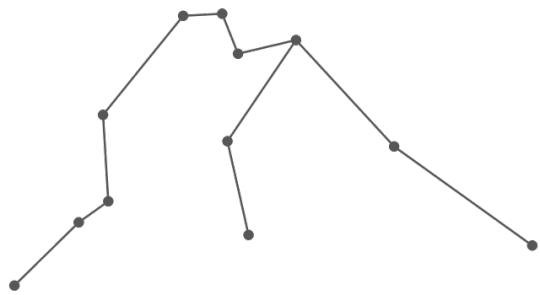
Symbol ▪︎ The Water Bearer
Element ▪︎ Air
Season ▪︎ Winter
Metal ▪︎ Uranium
Color ▪︎ Blue, Purple & Yellow
Ruling planet ▪︎ Saturn & Uranus
Modality ▪︎ Fixed
Nature ▪︎ Positive (extrovert)
AQUARIUS TRAITS
Purposefully esoteric
Doesn’t ‘do’ feelings, just concepts
Actually believes in conspiracy theories
More in love with humanity as a whole than individuals
Always feels like an outcast
Fetishizes personal freedom
Characteristics
Individualistic
Insightful
Assertive
Serious
Sarcastic
Curious
Independent
Witty
Humanitarian
Inventive
Clever
Sociable
Original
Independent
Eccentric
Opinionated
Honest
Unconventional
Imaginative
Insensitive
Indecisive
Intellectual
Idealistic
Visionary
Cool
Friendly
Thoughtful
Detached
Humanitarian
Original
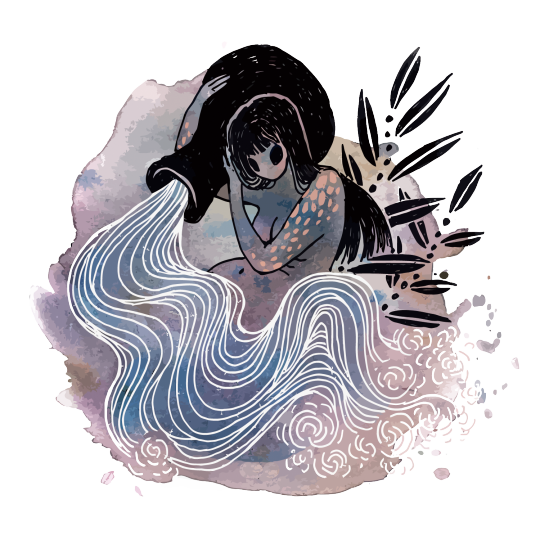
About Aquarius
WHAT KIND OF PERSON IS AN AQUARIUS?
Aquarians are archetypical outcasts. This doesn’t mean they’re loners. In fact, they thrive in large groups—charming you with their peculiar senses of humor, intriguing you with fun facts about the history of disposable straws, or convincing you to join their reading group. The alienation they feel is often self-imposed—a result of their knee-jerk contrarianism, rather than a lack of social intelligence. They try to be weird. They hang grapefruit rinds from the wall and call it art, they pretend to actually like noise music, they saturate their internal monologues with SAT words.
“Intelligence,” to them, means the ability to formulate the most unpopular opinion possible. If they were white sheep, they’d dye their wool black just to prove a point. They are destined to live their lives in direct opposition to the current world. In fact, they are world-builders. An entire universe exists in their heads, and this universe adheres to its own set of logic that doesn’t map onto reality. They are not liars. They are utopians. They are not cold. They are rational. To them, emotions are just holes in their idealistic vessels. Why succumb to sensitivity when there is so much knowledge to acquire, so many problems to be solved, worlds to invent?
They sometimes ask, “Why can’t I be normal?” but in reality, they find normalcy boring, and they stake their self worth on their ability to be interesting. They want to be unknowable. They want to evade definition. Definitions are binding little rules that other people use to restrict their movement, and they must resist anything that infringes on their freedom to drift. Between definitions, between the individual and the common, between themselves and humanity. The ultimate Aquarian struggle is resolving the tension between their need for community, and their need for complete detachment.
Aquarians are always running little tests. They live their lives as one big science experiment, using the element of surprise to collect reactions and construct theories about the intricacies of human nature. They are walking abstract art pieces, shattering traditional perspectives with their complete disregard for convention. They are martyrs to the cause of “humanity”, and “freedom” is their only demand.
2 notes
·
View notes
Text
WHAT CAN GO WRONG WILL GO WRONG! 🗣️ Stephen A. on Cowboys DRAFT DECISIONS
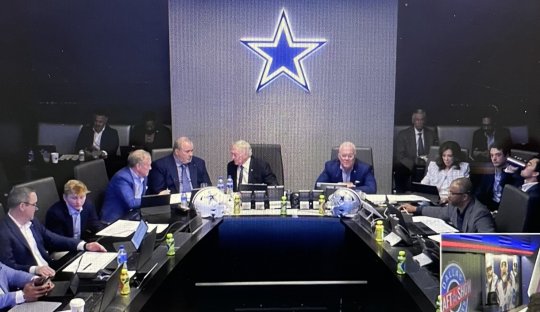
On First Take, Stephen A. Smith, Marcus “Swagu” Spears and Ryan Clark join Molly Qerim to react to Micah Parsons' comments on the Philadelphia Eagles drafting Quinyon Mitchell as "utterly disgusting" and if the Cowboys have any hope this season.
https://youtu.be/slaKJjKdEns?si=k5uoKXnZOSguP4kK
Marcus Spears' disappointment with the Cowboys' draft decisions stems from a lack of surprise, indicating a recurring pattern of underwhelming choices by the team's management. Despite hopes for improvement, the consistent letdowns have led to a state of resignation among fans and analysts alike.
The absence of pre-draft expectations sets the tone for an unsurprised reaction to the Cowboys' picks. This lack of anticipation reflects a broader sentiment within the Cowboys' fan base, suggesting a long-standing trend of underperformance has tempered hopes for dramatic improvements.
Michael Parsons' potential frustration, hinted at by Stephen A. Smith, aligns with the general sentiment of disappointment over the team's future prospects. As a current player, Parsons may feel the weight of fan expectations and the team's historical struggles.
The Philadelphia Eagles' draft choices are emphasized as a contrast to the Cowboys' decisions, adding to the competitive dynamics within the NFC East. The acquisition of players like Sequan Barkley adds depth to a division already perceived as challenging for the Cowboys.
The consensus among former and current Cowboys fans and players about the team's struggles underscores a shared understanding of the franchise's shortcomings. Despite differences in perspective, there's a collective acknowledgment of the team's perpetual challenges.
While disappointment lingers over the Cowboys' draft decisions, there's recognition that the team made logical choices given their draft position. This rationalization attempts to find silver linings in an otherwise disheartening situation.
Criticism is directed towards the Cowboys' front office for their lackluster offseason, which has contributed to fan frustration. This critique suggests a broader dissatisfaction with the team's management and decision-making processes.
Stephen A. Smith's expression of perturbation highlights a deeper concern over the absence of narratives that traditionally build hope among Cowboys fans. His frustration suggests a desire for more positive outlooks, even if they may be perceived as overly optimistic.
Marcus Spears and Ryan Clark engage in a discussion about managing Cowboys fans' expectations amid media scrutiny. Their conversation reflects an understanding of the delicate balance between realism and optimism in fan engagement.
Plans for attending a Cowboys game together signify a sense of camaraderie among analysts and fans, despite differing opinions on the team's prospects. This shared experience demonstrates a mutual love for the game and the team, transcending individual perspectives.
Read the full article
1 note
·
View note
Text
ic. And it is also easy to understand the credit given in advance to Levi
Strauss 's attempt to move beyond the antinomy of action consciously
oriented towards rational ends and mechanical reaction to determinations
by locating finality in mechanism, with the notion of the unconscious, a
kind of Deus ex machina which is also a God in the machine. The
naturalization of finality implied in forgetting historical action, which leads
one to inscribe the ends of history in the mysteries of a Nature, through
the notion of the unconscious, no doubt enabled structural anthropology
to appear as the most natural of the social sciences and the most scientific
of the metaphysics of nature. 'As the mind is also a thing, the functioning
of this thing teaches us something about the nature of things ; even pure
reflexion is in the last analysis an internalization of the cosmos' (Levi
Strauss 1 966: 248, my italics).
One sees the oscillation, in the same sentence, between two contradictory
explanations of the postulated identity of mind and nature : an essential
i I
I
J
Objectification objectified 4 1
identity - the mind i s a thing - o r a n identity acquired through learning
- the mind is the internalization of the cosmos. The two theses, which are
merged with the help of the ambiguity of another formulation, 'an image
of the world inscribed in the architecture of the mind' ( 1 964 : 346), in any
case both exclude individual and collective history. Beneath its air of radical
materialism, this philosophy of nature is a philosophy of mind which
amounts to a form of idealism. Asserting the universality and eternity of
the logical categories that govern 'the unconscious activity of the mind',
it ignores the dialectic of social structures and structured, structuring
dispositions through which schemes of thought are formed and transformed.
These schemes - either logical categories, principles of division which,
through the principles of the division of labour, correspond to the structure
of the social world (and not the natural world), or temporal structures,
imperceptibly inculcated by 'the dull pressure of economic relations' as
Marx puts it, that is, by the system of economic and symbolic sanctions
associated with a particular position in the economic structures - are one
of the mediations through which the objective structures ultimately structure
all experience, starting with economic experience, without following the
paths of either mechanical determination or adequate consciousness.
If the dialectic of objective structures and incorporated structures which
operates in every practical action is ignored, then one necessarily falls into
the canonical dilemma, endlessly recurring in new forms in the history of
social thought, which condemns those who seek to reject subjectivism, like
the present-day structuralist readers of Marx, to fall into the fetishism of
social laws. To make transcendent entities, which are to practices as essence
to existence, out of the constructions that science resorts to in order to
give an account of the structure and meaningful products of the accumulation
of innumerable historical actions, is to reduce history to a 'process without
a subject', simply replacing the 'creative subject' of subj ectivism with an
automaton driven by the dead laws of a history of nature. This emanatist
vision, which makes a structure - Capital or a Mode of production - into
an entelechy developing itself in a process of self-realization, reduces
historical agents to the role of 'supports' (Trager) of the structure and
reduces their actions to mere epiphenomenal manifestations of the structure's
own power to develop itself and to
#marxist leninist#marxism#communism#lenin#marxist- leninist#marxism-leninism#french theory#french#pierre bordeu
0 notes
Text
MBTI Research Scraps
OKAY- THIS IS ACTUALLY THE LAST ONE LOL
INTJ: Leads with intuition, focused, problem solver, not flexible, decisive, control freak, tyrannical, closed minded, overly critical, high expectations, good at listening, hard-working, original, well informed, independent, perfectionist, calm, aware of their feelings and emotions, but might not express them openly. They recognize their emotions, but does not display them visibly. handles emotions internally, processing and understanding them, without necessarily showing them through your facial expressions, socially clueless,
INTP: Leads with logic/accuracy, curious, overthinks, worried, flexible, sensitive, indecisive, open minded, procrastinator, no empathy, looks emotionless, unrealistic, awkward, lazy, tech savvy, loyal towards loved ones, nocturnal, independent, researches, can handle emotions well, but there are certain circumstances that trigger their emotions and can cause a visible or intense emotional reaction, struggles to follow rules, difficult to know
ENFP: good communication skills, empathetic, creative, fun person to be around, enthusiastic, dreamer, freindly, disorganized, overthinks, dependent, emotional, sometimes lazy
ESFP: optimistic, outgoing, bubbly, seductive, confident, enjoys people, socialable, friendly, focused on the present, explosive personality, charismatic, strong (physically & mentally) not a fan of abtrast topics, short attention span, gets bored easily, does not plan ahead, impulsive, manipulative, eccentric, hot temper,
ENTJ: strong leadership skills, well-organized, strong communication skills, charismatic, productive, serious, talented, ambitious, good desicsion making, professional, impatient, aggresive, intolerant, insensitive, heartless, intolerant, cold,
ESTJ: self-confident, hard-working, strong leadership, realistic, helpful, responsible, energetic, she wants things under control, a model, has a to-do list, practical, bossy, argumentative, not flexible, can’t express feelings, rigorous, always have so many things to do, always busy (especially when calling),
ESFJ: kind, loyal, enjoys helping others, willing to do what’s right, sensitive to criticism, controlling, dislikes change, can’t tolerate ideas easily, stylish, empathetic, calm and collected,
ISTJ: detailed, realistic, logical, practical, organized, loves to talk about logical things, rational, quiet, calm, loves reading and watching documentaries, looks cold, judging, subjective (unaware of what they really want. They have half-baked knowledge and they need many words to communicate what they mean), insensitive, tends to blame others, gets off-topic easily,
ESTP: funny, energetically, social, adaptable, flexible, resourceful, observant, gregarious, fiery, is ferocious, quick, minded (fast thinking skills), gets bored easily, egocentric, blunt, enthusiastic, insensitive, competitive, dramatic all the time, impulsive,
ENTP: innovative, likes to argue, sharp, chaotic, passionate, flirty, energetic, funny, most charismatic, charming, dialectical, cares in the inside, makes conversations interesting and handles them well, acts stupid but isn't actually one, does act confident but is insecure in reality, their arguments might spark controversy, doesn't like to be controlled, doesn't follow schedules, dislikes routines, unfocused, forgetful,
ISFP: practical, ingenious, observant, original, creative, observant, strong personal values, reserved, hands-on learning, reserved, quiet, dislikes arguments/conflict, theoretical, really need space for themselves, impulsive, really sensitive but hides that,
ISFJ: kind, gentle, empathetic, calm, quiet, sophisticated, elegant, respondisble, realiable, practical, the "parent" of the group, sensitive, is serious at work, protective of loved ones, dislikes change, avoids confrontation, neglect their own needs, not a fan of abstract things,
ISTP: smart, follows their instinct more than others, mostly learns by experience, realistic, practical, independent, enjoys learning new experiences, crafter, innovative, more interestes in projects, introvert, quiet but easy going, passionate, acts like they don't care but understand people, insensitve, rebel, difficult to know, risk taker, mysterious, enigmatic,
INFP: kind, soft, determined, loyal, , sweet heart, empathetic, open-minded, righteous, creative, immaginative, takes pics, shy, overthinks, too emotional, unrealistic, awkward, hides theirself away, cyber stalker, procrastinater, they value themselves,
INFJ: creative, idealist, peaceful, calm, wise, romantic, reserved, deep thinker, harmonious, pasionate, book lover, sweet appearence but cryptic in the inside, elegant, deep realtionships, sensitive, high expectations, dislikes confrontations, empathetic so they can fullfill others' needs,
ENFJ: outgoing, warm hearted, empathetic, open minded, passionate, thoughtful, organized, inspiring, good vibes, ambitious, reliable, affectionate, indecisive, easily convinced, too idealistic, intense (not everyone has same energy, but they push people) sensitive, condescending,
EDIT: I CANT- MY DAD ASKED ME WHAT IVE BEEN DOING FOR THE PAST 3 HRS, THIS IS WHAT I WAS DOING.
1 note
·
View note
Text
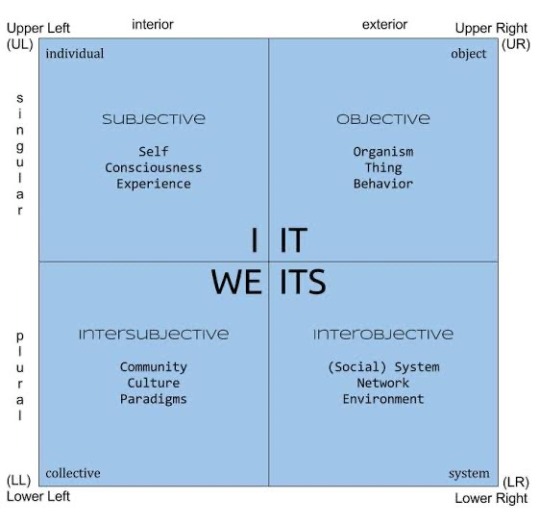
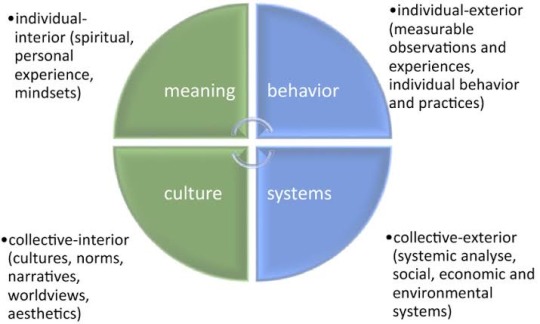
The Four Quadrants Of Knowledge: A Framework for Understanding Reality and Human Experience
Have you ever wondered how we can know anything about ourselves and the world around us? How do we make sense of the complexity and diversity of reality? How do we integrate different types of knowledge and experience into a coherent and comprehensive worldview?
One way to answer these questions is to use the four quadrants of knowledge, a framework developed by philosopher Ken Wilber based on his Integral Theory. The four quadrants of knowledge are a way of categorizing different aspects of reality and human experience, based on two dimensions: interior vs. exterior and individual vs. collective.
The interior dimension refers to the subjective and inter-subjective aspects of reality, such as thoughts, feelings, values, meanings, cultures, and worldviews. The exterior dimension refers to the objective and inter-objective aspects of reality, such as physical phenomena, behaviors, systems, structures, and institutions.
The individual dimension refers to the singular and personal aspects of reality, such as one's own consciousness, body, and brain. The collective dimension refers to the plural and social aspects of reality, such as shared values, norms, and practices.
By combining these two dimensions, we get four quadrants of knowledge: interior-individual, exterior-individual, interior-collective, and exterior-collective. Each quadrant represents a different perspective and domain of knowledge, and each quadrant is equally important and valid.
In this blog post, we will explore each quadrant in detail, and see how they can help us understand and appreciate the different facets of reality and human experience. We will also see how the four quadrants of knowledge can help us integrate and balance different types of knowledge and experience into a holistic and harmonious worldview.
In this section, we will describe each quadrant of knowledge in detail, giving examples and insights from different domains and perspectives. We will also see how the quadrants are interrelated and interdependent, and how they can enrich and complement each other.
1.)Interior-individual: This quadrant represents the first-person perspective of one’s own thoughts, feelings, moods, and logic. It is the domain of phenomenology, introspection, and consciousness studies. This quadrant answers the question: What is it like to be me?
The interior-individual quadrant is the source of our personal identity, creativity, and intuition. It is where we experience our inner world, our emotions, our dreams, and our imagination. It is also where we develop our rationality, our logic, and our critical thinking.
Some examples of interior-individual knowledge are:
-The feeling of joy when you achieve a goal or receive a compliment.
-The sense of wonder when you witness a beautiful sunset or a starry night.
-The idea of justice or fairness that guides your moral decisions.
-The belief in God or a higher power that gives meaning to your life.
-The memory of your childhood or a significant event in your life.
-The skill of playing an instrument or solving a math problem.
The interior-individual quadrant is important because it helps us understand ourselves, our motivations, our values, and our goals. It also helps us express ourselves, our opinions, our passions, and our talents. It is the basis of our self-awareness, our self-esteem, and our self-actualization.
However, the interior-individual quadrant is not the only or the ultimate source of knowledge and experience. It is limited by our subjective biases, our cognitive distortions, and our emotional reactions. It is also influenced by our social and cultural contexts, our physical and biological conditions, and our historical and evolutionary backgrounds. Therefore, we need to balance and integrate the interior-individual quadrant with the other quadrants of knowledge.
2.)Exterior-individual: This quadrant represents the third-person perspective of one’s own physical body, behavior, and brain. It is the domain of empirical science, neuroscience, and biology. This quadrant answers the question: What am I made of?
The exterior-individual quadrant is the source of our objective and measurable facts, data, and evidence. It is where we observe, test, and verify our hypotheses, theories, and models. It is also where we measure, monitor, and manipulate our physical and mental states, functions, and processes.
Some examples of exterior-individual knowledge are:
-The weight, height, and blood type of your body.
-The speed, accuracy, and efficiency of your actions and reactions.
-The structure, function, and activity of your brain and nervous system.
-The genes, hormones, and neurotransmitters that regulate your body and mind.
-The diseases, injuries, and disorders that affect your health and well-being.
-The drugs, supplements, and therapies that enhance or impair your performance and mood.
The exterior-individual quadrant is important because it helps us understand the material and biological aspects of our existence, our capabilities, and our limitations. It also helps us improve our health, our fitness, and our longevity. It is the basis of our scientific knowledge, our technological innovation, and our medical advancement.
However, the exterior-individual quadrant is not the only or the ultimate source of knowledge and experience. It is limited by our sensory perception, our instrumental accuracy, and our methodological validity. It is also influenced by our ethical values, our social norms, and our cultural paradigms. Therefore, we need to balance and integrate the exterior-individual quadrant with the other quadrants of knowledge.
3.)Interior-collective: This quadrant represents the first-person perspective of shared values, meanings, cultures, and worldviews. It is the domain of ethics, aesthetics, religion, and sociology. This quadrant answers the question: What do we care about?
The interior-collective quadrant is the source of our communal identity, morality, and spirituality. It is where we experience our shared world, our values, our meanings, and our purposes. It is also where we develop our culture, our art, our religion, and our philosophy.
Some examples of interior-collective knowledge are:
-The feeling of belonging and loyalty to your family, friends, or nation.
-The sense of beauty and harmony when you listen to music or watch a movie.
-The idea of right and wrong that guides your social behavior and interactions.
-The belief in a common cause or a greater good that inspires your actions and sacrifices.
-The tradition of your ancestors or a significant event in your history.
-The skill of communicating, collaborating, and cooperating with others.
The interior-collective quadrant is important because it helps us understand the social and cultural aspects of our existence, our relationships, and our roles. It also helps us express our values, our meanings, and our purposes. It is the basis of our ethical judgment, our aesthetic appreciation, and our spiritual transcendence.
However, the interior-collective quadrant is not the only or the ultimate source of knowledge and experience. It is limited by our group biases, our cultural relativism, and our ideological dogmatism. It is also influenced by our individual preferences, our physical environments, and our historical circumstances. Therefore, we need to balance and integrate the interior-collective quadrant with the other quadrants of knowledge.
4.)Exterior-collective: This quadrant represents the third-person perspective of social systems, structures, and institutions. It is the domain of politics, economics, ecology, and history. This quadrant answers the question: How do we organize ourselves?
The exterior-collective quadrant is the source of our collective facts, data, and evidence. It is where we observe, analyze, and evaluate our social phenomena, patterns, and trends. It is also where we design, implement, and regulate our social rules, policies, and laws.
Some examples of exterior-collective knowledge are:
-The population, GDP, and HDI of your country.
-The supply, demand, and price of your goods and services.
-The structure, function, and activity of your government and institutions.
-The resources, energy, and waste of your environment and ecosystem.
-The wars, revolutions, and reforms that shape your history and future.
-The tools, methods, and strategies that enable your social change and innovation.
The exterior-collective quadrant is important because it helps us understand the systemic and structural aspects of our existence, our challenges, and our opportunities. It also helps us improve our social order, our economic prosperity, and our ecological sustainability. It is the basis of our political power, our economic growth, and our historical progress.
However, the exterior-collective quadrant is not the only or the ultimate source of knowledge and experience. It is limited by our data availability, our analytical validity, and our evaluative reliability. It is also influenced by our ethical values, our cultural norms, and our individual interests. Therefore, we need to balance and integrate the exterior-collective quadrant with the other quadrants of knowledge.
Conclusion:
In this blog post, we have explored the four quadrants of knowledge, a framework developed by philosopher Ken Wilber based on his Integral Theory. We have seen how the four quadrants of knowledge can help us understand and appreciate the different aspects of reality and human experience, and how they can help us integrate and balance different types of knowledge and experience into a holistic and harmonious worldview.
The four quadrants of knowledge are:
1.)Interior-individual: The first-person perspective of one’s own thoughts, feelings, moods, and logic.
2.)Exterior-individual: The third-person perspective of one’s own physical body, behavior, and brain.
3.)Interior-collective: The first-person perspective of shared values, meanings, cultures, and worldviews.
4.)Exterior-collective: The third-person perspective of social systems, structures, and institutions.
Each quadrant represents a different perspective and domain of knowledge, and each quadrant is equally important and valid. However, each quadrant is also limited and influenced by various factors, and therefore needs to be balanced and integrated with the other quadrants of knowledge.
By using the four quadrants of knowledge, we can avoid the pitfalls of reductionism, relativism, and dogmatism, and instead embrace the benefits of pluralism, integration, and evolution. We can also expand our awareness, our empathy, and our wisdom, and become more compassionate, creative, and conscious beings.
1 note
·
View note
Text
The One Word Game A Psychological Device Or Just A Fun Pastime

The idea has some considerable acceptance in the world of psychology. The game is known as word association. Carl Jung, a noted Swiss psychologist, stated that emotions, reactions, and verbal responses, are actually connected to each other. As a result, the game might be said to have psychological foundations. Many experts, however, concluded that the game was little more than a collection of unstructured ramblings that had no introspective effect on the players' minds.
Now imagine you're visiting a friend's house with a large number of visitors. The game is then decided to be played by the host. There are much laughter, as well as amusing and filthy comments, and the party becomes more lively. You are not drinking and have decided to participate in order to fully comprehend the psychological effects.
The game begins, you respond to relationships with nonsense, religion with personal, rationality with necessity, and then when you hear the word academics, you fluster and reply with a response such as talent or capacity. Your friends laugh at you and call you a donkey for being concerned about academics; there are assurance-based nods and a lot of reassuring pats that you need not be concerned. After the party, you realize that you are actually quite concerned about your academics, and that anxiety has settled in the back of your skull, sucking the dopamine and serotonin (happy hormones) out of your system.
However, the question now is whether your stumble was caused by anxiety or just a change in pace where you couldn't think of an appropriate response. Also, the later realization, that you may really be worried about your academics, is a logical conclusion, or just you overthinking since the word made a fool out of you in front of your peers, and now you have made hasty conclusions that you really worry about your grades so much that it has occupied some part of your sub-conscious and tends to the moods full of misery that you accompany (more common than you might believe).
To Read This Full ARTICLE, Click Here
0 notes
Text
Movie Review | Final Destination (Wong, 2000)
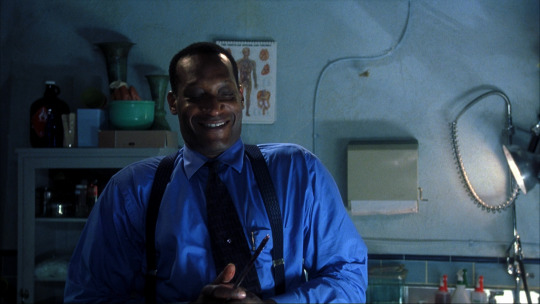
I understand the movie originated as a spec script for The X-Files (some of the creative talent behind the movie worked on the show), but given its release date, I can’t help but read it at least in part as a reaction to Columbine, with its teenage characters reckoning with their own mortality in the face of almost unmotivated death. This is probably sturdier on a dramatic level than a lot of horror movies from the era as it actually spends time with these characters and affords them a chance to process their trauma. It isn’t just the protagonist played by Devon Sawa, or the sensitive girl played by Ali Larter (we know she’s sensitive because she’s a brunette with a choker necklace; she becomes a blonde when she gets a new lease on life) who get this opportunity. Even the fears of the goofball played by Sean William Scott and the bully played by Kerr Smith are treated seriously. Watching this after Jennifer’s Body was a little jarring in this respect. That movie was made almost a decade later, when certain kinds of tragedies had seemingly become more commonplace in America, and as a result rituals of collective mourning had become more codified and sometimes tastelessly fell into kitsch. The mourning here is sincere.
The fact that the death here is not motivated by human concerns means that this evokes a sense of existential terror more potently than a lot of horror movies of the era. In that sense, it might even invite comparison with something like City of the Living Dead (a number of horror filmmakers are namechecked, but Fulci is not), although this brings the proceedings back to some semblance of rationality by having its heroes try to decode the logic by which they’re being killed off, while a pair of FBI agents bear deadpan, bemused witness. (That’s the filmmakers’ X-Files background showing.) Lest I make this sound like an entirely gloomy affair, there is a certain morbid humour in some of the death scenes, which mostly play like the reveal from “The Boy Who Knew Too Much” episode of The Simpsons. (If you’re accident-prone like me, they’ll send your anxiety through the roof.) And also in the measures taken by the heroes to ward off death, like the scene where an unkempt Sawa eats canned food while wearing gardening gloves and narrowly avoids getting tetanus from a rusty hook. And there’s a pretty fun climax full of sound and fury, where every single inanimate object in Larter’s vicinity becomes anthropomorphized as they all try to kill her.
0 notes